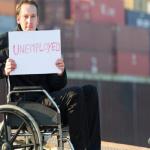Disabled Workers Are Struggling To Get Jobs, Even in a Labor Shortage

Even in a remarkably tight labor market, Americans with disabilities are struggling to land jobs.
Why it matters: These are folks who are willing and able to work, and getting them into jobs would help alleviate the labor shortage.
The big picture: Individuals with disabilities have always faced higher unemployment rates, in no small part because of employer discrimination and biases in the hiring process.
What's new: In tight labor markets, the gap between unemployment rates for people with and without disabilities typically narrows. Yet now the gap is widening. There are a few factors that could help explain this:
- Sectors like retail or hospitality that are most acutely in need of workers are more challenging for people with disabilities — they might be more physically demanding or require longer hours.
- Plus, COVID risk is still something that many of these folks have to consider.
- Meanwhile, more Americans have disabilities now. The pandemic drove a surge in the number of disabled people in the U.S, many of whom suffer from long COVID.
State of play: In April, 8.3% of disabled Americans were unemployed, compared with 3.1% of those without a disability.
- The labor department relies on a monthly survey to figure out the number of workers with disabilities, asking respondents to identify whether anyone in their household is deaf, blind, or has difficulty walking, for example.
A report released Tuesday morning by the Center for American Progress finds that removing obstacles for disabled workers would strengthen the labor market.
- If disabled workers were employed at the same rate as those without a disability, nearly 14 million more would have been working in 2021, according to the analysis in the report.
- The report also found that Black and Hispanic workers with disabilities saw higher unemployment rates than their white counterparts in 2021.
What they're saying: Stephanie Corrigan, a 40-year-old woman with a disability, tells Axios that "it's only been ghosting and silence from companies." She's applied to around 200 jobs in graphic design with no luck since 2020. She usually discloses her disability in applications when asked.
- She's received advice not to disclose because employers could be turned off, Corrigan says. But she worries that disclosing after the fact would also imperil her job prospects.
"There's discrimination at all levels of the pipeline," said Mia Ives-Rublee, the director of the disability justice initiative at the Center for American Progress who coauthored the report.
- For instance, job requirements could be listed that would discourage those with a disability, but that actually aren't relevant to the job. Say, a note that you'd have to lift 25 pounds for an office job.
- Employers might not provide accommodations in an interview.
- Or, there's just flat out bias: "They see you as a disabled person and decide you can't do the job," she said.
Worth noting: Discrimination isn't the only factor at play. Americans with disabilities often work part-time — or not at all — so they don't lose access to Medicaid or social security benefits, which have strict and low limits on how much you can earn. Advocates like Ives-Rublee are seeking to change those rules.
What to watch: The EEOC recently warned employers about the potential for discrimination in using algorithms or online job applications to screen candidates. For example, an employer's online application might not work with a blind applicant's computer screen reader.
- "New technologies should not become new ways to discriminate," chairwoman Charlotte Burrows said in a statement.
